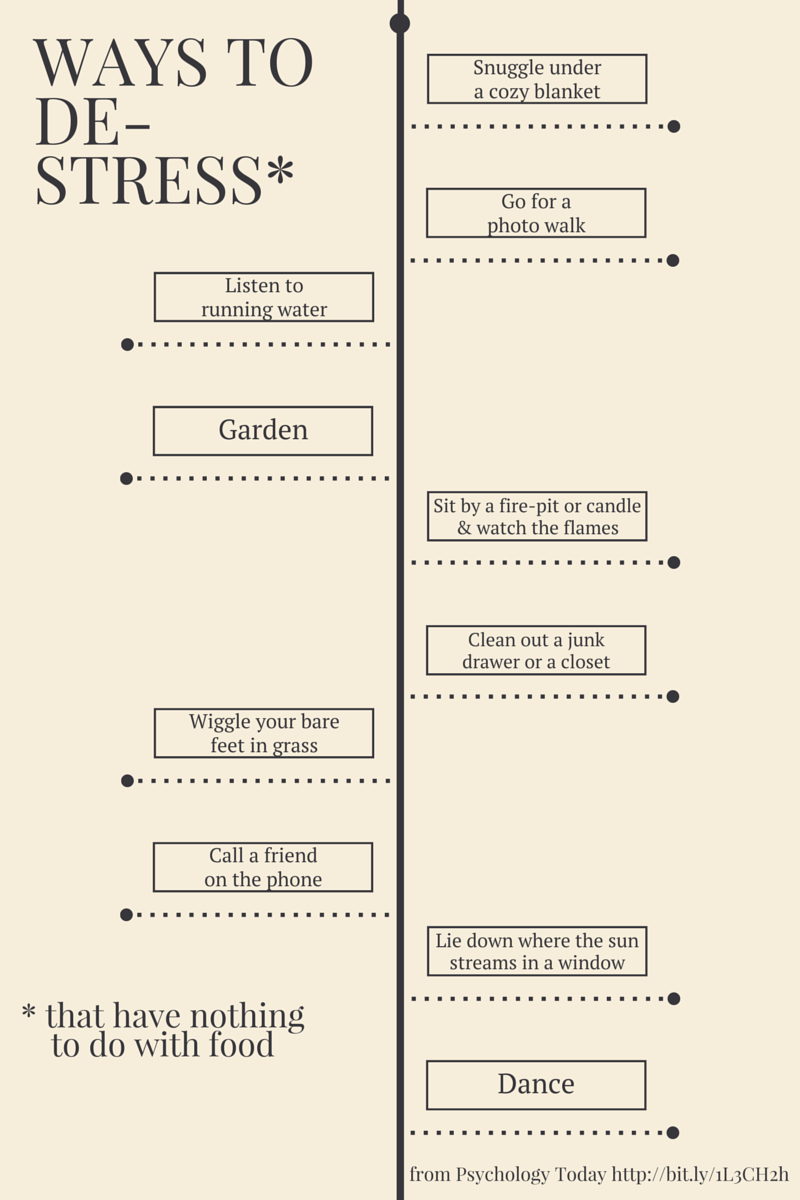Eating when stressed happens to us all. It is a normal part of life, however if it happens too often, it can lead to even more stress and no one needs that!
Some people call it emotional eating, others call it comfort eating. Regardless of what you may call it, it often is not the most efficient way to reduce stress and cope with hard times. In fact, for people who are trying to eat well and manage their weight, it likely leads to even more stress!
Here are 6 ways you can reduce stress eating (and no, none of them involve locking the fridge!):
Reduce stress more efficiently without food.
Ask yourself, has food ever helped to reduce stress in the long term? It is ok to reach for food to comfort yourself sometimes, but making it a habit is a bad idea. It can be an inefficient coping mechanism that doesn’t get to the root of the problem.
If reaching for food for reasons other than hunger, take a moment to ask yourself what you really need? If it is for stress relief, then find a few things you can do to reduce stress that are effective, easy and fun to do. Create a list today, so you have it on hand when you need it. It is worth taking 5 or 10 minutes to reduce stress before getting back to studying or working.
Check out the graphic below to get some ideas:
Check in with your body before eating.
Before reaching for food, ask yourself “am I hungry?”. Take a deep breath, ground yourself and tap into your mental feelings as well as physical feelings. If you are hungry, it is important to eat. Your hunger will help you to determine how much food you need. Understanding what you feel like eating and what kinds of food feels right at this time will help you feel satisfied.
Choosing a balanced snack or meal will help you manage stress since they allow energy levels to be more constant over the day. Study sessions or paper-writing marathons are best fueled with a meal or snack that contains carbs, protein and fiber. If you check in and find that you are not actually hungry, check out the next point.
Manage cravings when you want to eat but are not hungry.
If you tap into your hunger levels and realize that you are not really hungry, there are a few techniques that can help you ride out the wave of the craving. Managing cravings takes some practice, but it is well worth the effort up front.
Here are 5 steps to help you better manage cravings. Please note, that step 5 outlines what to do if you decide to satisfy your craving by eating. If you have tried to manage the craving for food and find yourself wanting to eat anyways (even though you are not hungry), that is ok! Give yourself permission to eat if you’ve tried the other 4 steps. By doing this you will be more likely to eat a reasonable portion.
Reduce guilt associated with eating junk and your body size.
When you do end up eating fun foods, or foods that may have less nutritional value, don’t beat yourself up. It is normal to want to eat foods high in sugar, fat and salt and it is totally normal to eat them once in a while. It is a complete waste of energy to feel guilty and ashamed for eating these foods and in fact, this guilt only pushes us to eat more of these foods. Indulging in a treat once in a while is good for the mind and the body. Also, planning out this treat can help motivate you to eat well throughout the week since it gives us something to look forward to. Remember, thinking of it as a treat, not a cheat, will help you eat a reasonable portion.
Have healthy and fun foods available.
Sometimes we eat food because we believe it will not be available later on. Eating for fear it is our last time to enjoy it is not hunger based eating. It may sound counter intuitive, but keeping an abundance and wide variety of foods available can help reduce eating due to perceived scarcity or deprivation. When we haven’t eaten a treat in a while (say cookies) or a specific food (say bread) we tend to eat it to excess when it is finally available. See that pattern? We avoid a so called “bad” food, our cravings for it increase, when it finally is in our reach we overeat (thus fulfilling our worst fears), then try to cut it out completely. Stop the cycle!
related: 10 Must-Have Snacks for Your College Dorm Room
Also, making sure you have plenty of healthy food close by can greatly increase your chances of reaching for a healthy snack. Focus on your favorite fruit or yogurt when buying snacks so that you will actually want to eat them.
Reduce food rules.
This goes along the same lines as keeping fun foods available and not feeling guilty for eating them. When we have lots of rules surrounding food (such as don’t eat any sugar or no eating after 7pm), they are bound to be broken and when they are, overeating tends to happen. This is especially true when going through a stressful time such as school. Food rules require our close attention. School and life in general are filled with priorities and things that take our attention away from following food rules. Once our attention is on something else, rules tend to be broken because it is too hard to eat restrictively AND get all the projects, studying and papers done. Once a food rule is broken, we tend to eat to excess, maybe even binge. This makes us feel terrible both physically and mentally, which fuels binges and solidifies our erroneous thought that rules are needed.
Break the overeating cycle by throwing out the rules and using your hunger and fullness as guides. I know this sounds scary to those of you who may be used to dieting and following rules, but it helps to conserve energy for the more important things in life.
If you want to pursue a more mindful eating pattern of eating and want some support, seek out a registered dietitian or psychologist who specializes in mindful or intuitive eating.
 Lisa Rutledge is a registered dietitian nutritionist who helps her clients rebuild a healthy relationship with food. She gives clients the confidence and permission to get excited about the food they eat. Her goal is to help people who feel overwhelmed with food choices improve their confidence in their ability to eat healthy foods. Lisa encourages clients to stop worrying about every little detail of what they eat and start seeing the bigger picture of health and happiness. You can find her on Twitter, Facebook, Pinterest and Youtube!
Lisa Rutledge is a registered dietitian nutritionist who helps her clients rebuild a healthy relationship with food. She gives clients the confidence and permission to get excited about the food they eat. Her goal is to help people who feel overwhelmed with food choices improve their confidence in their ability to eat healthy foods. Lisa encourages clients to stop worrying about every little detail of what they eat and start seeing the bigger picture of health and happiness. You can find her on Twitter, Facebook, Pinterest and Youtube!



Love this! The whole thing about breaking food rules is a great tip–most of them are so unrealistic to follow in college!
LikeLike
For real! I wish it was easier but sometimes you just gotta be realistic!
LikeLike
Hey there! We here at TFPOF absolutely love the blog and we hope you don’t mind that we’ve referenced this post in one of our upcoming specials!
LikeLike
Thank you I love islam
LikeLike
This post is so helpful! Stress eating is something I struggle with from time to time, but I find that if I only keep healthy food in the house its easier to manage. I’ll also take a bath with a bath bomb to distract myself! http://carleehebert.com/
LikeLike
Which program did you use for the infographics? I’ve been searching the internet for a template like the first ole but haven’t been able to find.
LikeLike
Thanks for helping out, fantastic information.
LikeLike